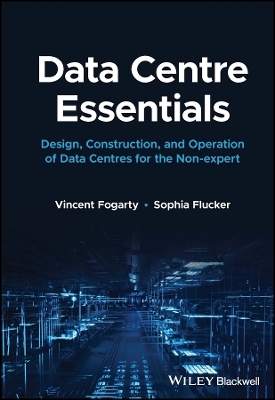
Data Centre Essentials
Wiley-Blackwell (Verlag)
978-1-119-89881-8 (ISBN)
Data centres are spaces where computer systems, physical network technology and associated components are housed, operated and monitored, and any industry or business that employs computer systems or networked systems at any scale will interact with data centres. Data centres are complex and expensive to build and operate, and successful project delivery requires a wide range of specialised knowledge and skills. This accessible reference lays out the requirements for creating these essential facilities.
Data Centre Essentials is a comprehensive survey of the essential principles of data centre design, construction and operation. It is designed to provide those involved in a data centre project or providing professional service deliverables to the data centre industry but do not have a technical background or deep sector experience with the understanding required to participate in such projects. The non-technical language and thorough engagement with key considerations make it ideal for anyone looking to understand one of the pillars of a digital society.
Data Centre Essentials readers will also find:
An authorial team with decades of combined experience in engineering and construction consultancy
Detailed information about every stage in the process, including securing investment and the building process
Working lexicon of key data centre terminology
Data Centre Essentials is a must-own for contractors, engineers and construction project managers involved in data centre projects and will be invaluable for professionals such as lawyers, financial and insurance advisors, surveyors, engineers and architects who do not necessarily have deep domain experience but find themselves involved in or are interested in engaging in, data centre projects.
Vincent Fogarty is a consultant with 40 years of experience working on construction and engineering projects. He is a fellow of the RICS, a member of the Chartered Institute of Arbitrators, and a specialist in mechanical and electrical engineering and quantum matters. Sophia Flucker is an engineering consultant with extensive experience in data centre design, commissioning, and assessment, with years of experience working on projects in multiple countries. She received an Infrastructure Masons IM100 Award in 2020 in recognition of her contributions to the digital infrastructure sector.
Acronyms & Symbols xi
Foreword by Tom Glover xv
Preface xvii
Acknowledgements xxi
About the Authors xxiii
1 Introduction 1
2 What Drives the Need and the Various Types of Data Centres 5
Data Demand versus Compute Efficiency 8
Workload Placement 15
The Core Components of a Data Centre 18
Types of Data Centres 18
Entreprise Data Centre 18
Colocation 20
Public Cloud 21
Urban or Edge 21
3 Site Selection 23
Climate 26
Access Roads and Airports 27
Air Quality 27
Likelihood of Natural Disasters 28
Ground Conditions 29
Communications Infrastructure 29
Latency 30
Proximity to Subsea Cable Landing Sites 33
Density of Fibre Telecommunication Networks Near the Data Centre 33
Geopolitical Risks, Laws, and Regulations 34
Availability and Cost of Electrical Power 35
Natural Resources 36
Airport Flight Paths 36
Electromagnetic Interference 37
Taxes, Regulations, and Incentives 38
Incentives 39
Know the Stakeholders 41
Expect the Unexpected 41
Traditional Due Diligence 42
Retrofitting Commercial Buildings for Data Centres 42
Clusters 43
Qualitative Analysis 48
Quantitative Analysis 48
4 IT Operations and the Evolution of the Data Centre 51
Max Schulze
Beginning of IT Infrastructure 54
Bringing Enterprise IT to Maturity 55
IT Applications as Standalone Products – The Digital Economy 55
Second Iteration of the Internet 58
Key Ingredients for Digital Products 61
Difference Between Enterprise IT Infrastructure and Hosting Infrastructure 64
Commoditisation of IT Infrastructure 65
Virtualisation: Servers and Data Centres as Generators for Digital Resources 65
Software-as-a-Service: Digital Natives Entering the Enterprise 68
Great Outsourcing of Enterprise IT and the Growth of the Colocation Model 70
When Digital Products Scale – or the Invention of Hyperscale 71
A Change in Architecture – The Rise of Cloud Infrastructure 72
Origin of a Market for Digital Resources 75
When Cloud Infrastructure Became Cloud Services 78
When Microsoft and Google Joined the Party 79
Kubernetes and the Next Layer of Abstraction 81
How Traditional Hosting Companies Have Been Left Behind 82
How the New Paradigm of Cloud Infrastructure Is Changing How Data Centres Are Built 85
Central Role of Connectivity in the Future of Data Centre Architectures 86
Problem of an Old IT Philosophy 87
5 Overview of Infrastructure 89
Power 93
Cooling 97
BMS 106
Fire 106
Security 107
6 Building a Data Centre: Stakeholders, Design, Construction, and Commissioning 109
Stakeholders and Project Stages 109
Pre-project 110
Pre-design 111
Classifications, Standards, and Certifications 112
Design 112
Bricks and Mortar versus Modular Build 115
Procurement 116
Construction 120
Construction Design and Management 2015 (United Kingdom) 120
Commissioning 122
Handover 124
Operation 125
7 Operational Issues 127
Handover 127
Legacy Facilities 128
Operations Team 128
Uptime and Failures 130
Maintenance Processes and Procedures 133
Managing Change 135
Capacity Management 136
Training 136
Performance Optimisation – Beyond Reactive Maintenance 137
8 Economics, Investment, and Procurement of Data Centres 139
Enterprise 140
Colocation 141
Retail Colocation 141
Wholesale Colocation 142
Retail versus Hyper-scale Data Centres 142
Retail Data Centres 142
Hyper-Scale Data Centres 142
Investment and Procurement 143
Investment in Colocation Facilities 143
Power Supply Arrangements 146
Other Complexities 148
Valuation 149
Colocation Leases 155
Wholesale Colocation 156
Retail Colocation 156
Service-Level Agreements (SLAs) 157
Managed Hosting and Cloud Services 157
Total Cost of Ownership (TCO) 158
Merger and Acquisition 159
9 Sustainability 163
Corporate Sustainability 163
Energy Consumption and Energy Efficiency 166
Renewable Energy 170
Generators 171
Water Usage 171
Heat Recovery 172
Life Cycle Impacts 173
Green Building Certifications 175
Policy and Regulation 176
Conclusion 176
10 The Importance of Planning to Avoid Things Going Wrong 177
Andrew McMillan
Introduction 177
Acquisitions and Investments 178
Operating Models and Commercial Contracts 183
Funding Investment 184
Construction 184
Choice of Contract 184
Technical and Pricing Schedules 185
Risk Allocation 185
Usual Suspects 186
Infrastructure Provision and Project Rights 187
Construction 188
Moving to Low Carbon Solutions 188
What Are Data Centre Operators Doing to Transition to Low Carbon? 189
Corporate Power Purchase Agreements (CPPAs) 190
On-site Generation and Electricity Supply 191
Backup Power 192
Where Could Other Efficiencies Be Made? 193
Ensuring Resilience 194
Intellectual Property Rights 194
Data and Cyber/Regulatory Compliance 196
Disputes 196
Conclusion 198
11 Around the Corner, What Could Happen Next 199
Glossary 203
Index 207
| Erscheinungsdatum | 15.09.2023 |
|---|---|
| Verlagsort | Hoboken |
| Sprache | englisch |
| Maße | 170 x 245 mm |
| Gewicht | 599 g |
| Themenwelt | Technik ► Bauwesen |
| ISBN-10 | 1-119-89881-1 / 1119898811 |
| ISBN-13 | 978-1-119-89881-8 / 9781119898818 |
| Zustand | Neuware |
| Haben Sie eine Frage zum Produkt? |
aus dem Bereich


